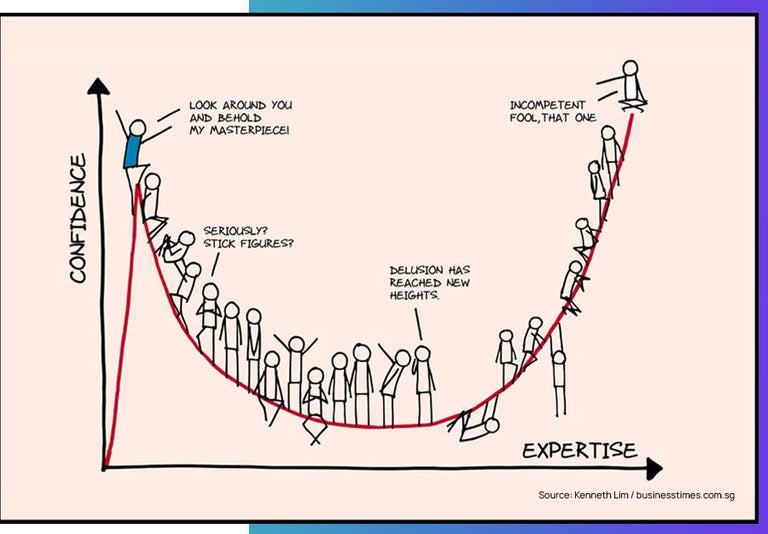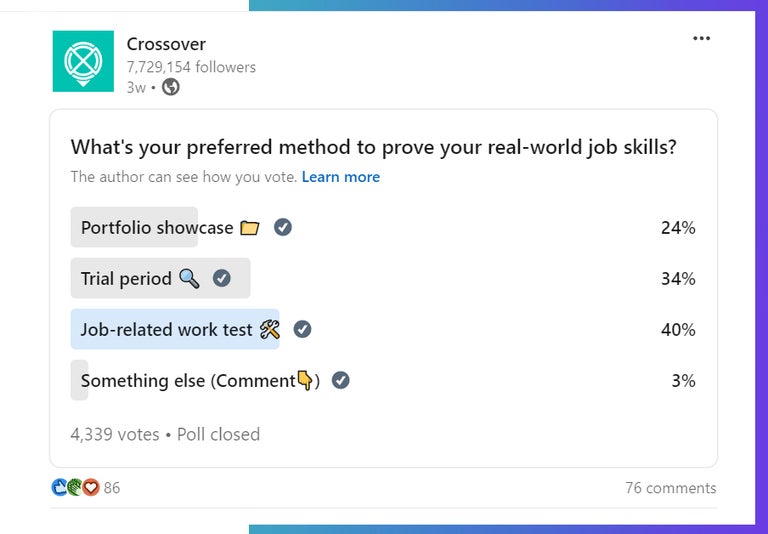Contents
- Secret #1: They Are Designed to Eliminate You
- Secret #2: Avoiding Traditional Interviews = Success
- Secret #3: Skills Tests Advantage the Highly Skilled
- Secret #4: Smaller Playing Field = Greater Opportunity
- Secret #5: At The Top Maximum Effort Wins
- Crossover Skill Tests: What Happens When You Don’t Pass?
- Your Next Great Opportunity: Sharpen Your Blade
We need to talk about skill tests. Avoiding them may feel like a shortcut – but much like a samurai who neglects their sword, it dulls your edge over time. And these days edge = demand. You must do more, to be more.
If you’re aiming for the top, sharpening your skills through these tests is your path to mastery…and the elite remote opportunities that come with it.
Degrees and job titles are an inaccurate and outdated way to surface top talent on a global scale. That’s why in 2023, 73% of employers used skill tests to find good people.
It’s not so much a trend as an industry shift – and ignoring it will harm your career.
Skill tests are the answer to the blistering pace of workplace change – and not just in tech.
But it’s become abundantly clear that many exceptional remote workers are still following the rules of a dying game.
To combat this: here are the skill test secrets that elite remote workers know that you don’t.
By the end, I hope you’re better poised for the next skill test you will face. After all, they’re getting trickier, more difficult and more specialized.
Time to sharpen that blade.
Secret #1: They Are Designed to Eliminate You
If you’ve ever thought:
“I’m more than my test scores – why can’t employers see that?”
“Another skill test? Why do I have to prove I’m good enough yet again?”
“Why should I take a test when my real-world experience should speak for itself?”
Or my favorite… “This isn’t school!”
You’re in the majority – but that’s not where you want to be.
I’ve said it before, and I’ll say it again: skill tests are the best way to find candidates that are a good match for the job. Competence over credentials is the new workplace mantra for global remote hiring.
- There’s a bad hire epidemic at play - it’s costly for brands and hiring the wrong person stunts progress. Career Builder says 74% of companies have done it.
- Skill gaps are deadly to innovation, and make no mistake there is a talent shortage in tech right now. SHRM research shows 77% of HR pros are still struggling to find appropriate candidates for top roles.
- Resumes are not reliable or credible anymore. Our testing partner Criteria Corp (the one we use for skills tests at Crossover) says 72% of people have confessed to lying on their resumes, while at least 49% have admitted to the use of AI to write their resumes already.
These factors, coupled with better hiring decisions, turnover reduction and improved worker performance make a compelling case for increasingly difficult skills tests.

Companies will always want to find and hire the best people.
These tests are designed to weed out weak performers for the job.
If you never even get to the point where you test – you’re dooming yourself to mediocre jobs forever.
Secret #2: Avoiding Traditional Interviews = Success
Let’s admit that traditional interviews are the actual worst.
A few years ago, I was passively hunting for a new challenge, and lining up a set of nice interviews with relevant tech companies.
It was traumatic.
Among my experiences:
- A young, hungover recruiter who didn’t know who I was and didn’t care
- A job offer that turned out to be half of what was stated, no reason given
- An interview with a tech start-up founder who didn’t know what to say or ask in the interview, so I had to lead my own interview (?)
- A recruiter who asked me to read her my resume as she applied mascara
- A series of interviews where they mined me for what my job would entail (then they updated the job description)

Most of these interviews were an outright waste of time, but they did teach me something fundamental: proving yourself in a test environment is extremely valuable.
Because it alt, control, deletes the inefficiencies of human bias.
Anyone who has applied for remote jobs on LinkedIn and has been invited to interview knows that it’s a corner store lucky packet.
It’s the job equivalent of Omegle.
You’re connected with a random person without any knowledge about who they are, if they know who you are, or what they want from you.
Video interviews are no way to determine job suitability, that’s for sure. There is endless Cambridge research on how these kinds of unstructured interviews aren’t just irrelevant, they’re actively harmful.
And its why top remote workers avoid the trauma of applying to multiple jobs where traditional interviews are the default. It’s inefficient. It’s tacky.
It says a lot about the company (and what it will be like working there). A company that tests for skills has recognized this problem and has moved to solve it.
Secret #3: Skills Tests Advantage the Highly Skilled
Call me Captain Obvious, but this one needs to be said.
Skill tests give people who are the best – and the most competent – a massive advantage.
And this can be intimidating in a world where most people think they’re highly competent, when the reality is that they’re not.
It’s so common in fact, there’s a name for it: The Dunning-Kruger Effect.
It’s a type of cognitive bias that makes it difficult to see or recognize our skill level (or lack of skill).

Thinking we are smarter and more capable than we authentically are, is part of being human. And we are all prone to the effect.
But when it applies to your job skill – it’s a double whammy!
A good example is in the field of Finance. Most amateur investors believe they have a knack for investing, when in reality only 5% of them will ever crack a profit.
Yet trading continues!
Ironically, if you don’t ever participate in skills tests, and use them as many elite remote workers do – as benchmarks of progress – you’ll never truly gain that invaluable context.
How skilled are you…really?
Competition exists for comparison. You’re in the competition regardless of whether or not you choose to participate.
Highly skilled remote workers don’t magically become that way. They don’t shy away from learning, they upskill constantly, and this keeps them competitive.
That’s why there’s a correlation between the type of person willing to do tests and high performance. Fear of failure isn’t going to hold these rockstars back!
Every skill test, regardless of whether it’s passed – is a learning opportunity. A stepping stone to their next career leap.
One indicator of performance and aptitude here at Crossover is having a high-quality bar. It underpins everything we do, and it’s tough to teach. People prone to the Dunning Kruger Effect wouldn’t know that their work isn’t high enough quality.
While extroverted (and incompetent) people were once rewarded for being overconfident in interviews and at the office – skills-based hiring leaves them outside the talent pool. Ouch.
Out with the old and inefficient, as they say.
Secret #4: Smaller Playing Field = Greater Opportunity
Why fish in the ocean when you can access your own private lake?
We recently ran two consecutive polls across LinkedIn to gauge how our audience felt about showcasing their skills and how they’d prefer to prove them to hiring managers.
In the first poll, 7653 people weighed in on whether online assessments, real-world projects, hackathons or traditional interviews were best.

The results highlight a key insight: while 57% of remote workers prefer showcasing their skills through existing projects, only 25% of them understand the unique power of online assessments.
A jaw-dropping 75% of remote workers would rather lean on experience/results, hackathons and outdated interviews to land their next elite role.
The trouble of course is that tech companies LOVE skill testing.
Google, IBM, Walmart, Boeing, Revolut, Steelcase and Catalyte – they all swear by skills-based hiring. It’s hard to find a tech company who isn’t skills testing these days.
Their pre-employment tests are like ours: CCAT tests, language proficiency tests, communication tests, and technical skills tests.
The second poll asked our audience what their preferred method of proving real-world job skills might be. In this one, 4339 people had their say.

Interestingly 40% of you said job-related work tests would win. Followed by 34% who prefer trial periods, 24% portfolio showcases and the odd one or two (3%) who cited interviews again.
Still, that’s a solid 60% of remote workers who would avoid the tests.
Elite remote workers know that the best jobs are hard to get – and most people (regardless of their capabilities) aren’t willing to go to battle to win these coveted positions.
A room full of skilled opponents is always better than an unskilled battalion on a battlefield.
Secret #5: At The Top Maximum Effort Wins
Here’s the thing: skill tests tell the reviewer a lot about the candidate. Way more than you think.
Sure, they exist to test the job-related skill, but they offer oh so much more.
They give your reviewer insight into test preparation, your mindset, task interpretation and comprehension, subject matter expertise, written communication ability, voice and how the depth of your experience would relate to the job role.
That’s why if you can IMPRESS your reviewer in a skills test, it’s a shoe-in.
If 20 people can do the skills test correctly, believe me only one or two will stand out – knocking it straight out of the park. Those are the people who get interviews.
It’s the hidden skill you didn’t know you needed: Taking skill tests!
Learning how to crush a skills test takes research, strategy, preparation and flawless execution (especially if its timed).
Don’t be blasé about it. Don’t undervalue the process or shirk on the learning opportunity. When you always do your best, you climb higher, faster.
And when you fail – and you will – you’ll get better. Then one day you’ll land a six-figure role in a fully remote job that changes your entire life.
These sorts of things don’t happen by accident. They happen by design. Be the kind of elite remote worker who tries until they win.
Maximum effort – the hallmark of the top 1%.
Crossover Skill Tests: What Happens When You Don’t Pass?
There’s an elephant in this room.
We have our own conspiracy theory that circulates about what we do with candidate submissions. And try as we might, it pops up every now and then!
We enlisted the help of Heather Lother, our VP of Talent and People Operations to debunk the myth about what we do with candidate skill test submissions.

When applicants fail, some of them insist that we’ve somehow built our company on ‘free work-related job assessments’ – like we’re villains in a Disney movie.
They say that we profit from submitted work-related skill assessments during the hiring process.
That’s of course completely bonkers.
According to Heather:
“Our Real Work Assessments use problems, projects, or tasks that have already been solved. So, while we look forward to seeing your creative solutions, hiring teams have no reason to borrow your ideas.
Interviewers and hiring managers review candidate submissions to prepare for interviews or make hiring decisions (e.g. in tie-breaker situations).
Candidate submissions are only consulted after the candidate has been rejected if they apply for a different role that requires the same assessment (the candidate doesn’t have to submit it more than once).
These submissions are only reviewed by the hiring team and our centralized grading team. Hiring managers have to agree not to use candidate ideas without permission in order to participate in the Crossover hiring process.
You can revoke access to your written submissions at any time, but we recommend waiting until after you’ve received a final determination on your application, since hiring teams often refer back to these when making a decision about which candidates to invite to an interview or extend an offer to.”
There you go.
- We’re not mining your data, we’re testing your job skills
- We’re 100% compliant with all data compliance laws
- We have 5000+ people around the world who have been hired!
Despite this glaring evidence, some people still choose to believe the conspiracy over the more hurtful Dunning Kruger Effect.
Imagine scamming people (without their knowledge) into free labor so that we could build and sell technology. The logistics alone would be impossible.
I’m not entirely sure what 1000 different answers to the same question would build – but it would definitely be the most inefficient and costly way to build technology in the history of Silicon Valley.
The reality is that – like many tech companies (who are our clients) we are looking for needles in a vast global haystack.
To find YOU, we need to cast a wide net.
Your Next Great Opportunity: Sharpen Your Blade
Have you been dodging skill tests?
It’s time to get brutally honest with yourself. No matter where you apply in tech, the biggest and best remote positions use skills-based hiring to find worthy candidates.
That’s why elite remote workers live by these skill test secrets.

They know that skill tests are tools designed to cut out the weak, not waste their time.
They bypass the inefficiency and bias of traditional interviews, embracing skill tests as the ultimate proving ground.
These top performers seize the advantage of a smaller, more competitive arena - where fewer rivals mean more opportunities.
And they understand that at the top, maximum effort is non-negotiable. Passing a skill test isn’t enough - you must stand out to win.
It’s easy to dismiss failure as a scam, but that mindset instantly disqualifies you.
Instead, I urge you to invest in yourself. Use these secrets to unlock your full potential.
Take a cue from Aliza Saeed, who failed to land a Crossover job repeatedly before she triumphed. She’s proof that persistence pays off – and she’s not alone!
So, for those still hesitant – put on your armor, pick up your blade, and join the fray. We all pick our battles. But victory belongs to those who aren’t afraid to be tested when the time comes.








